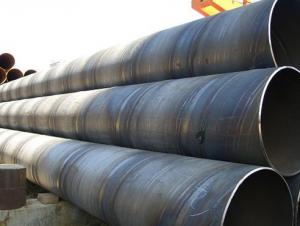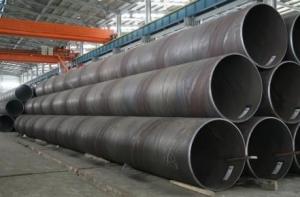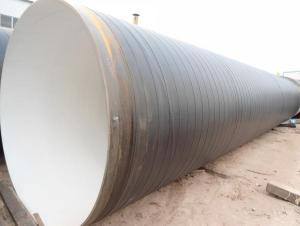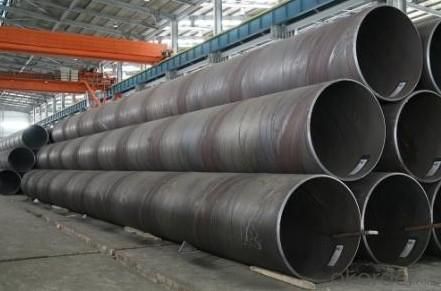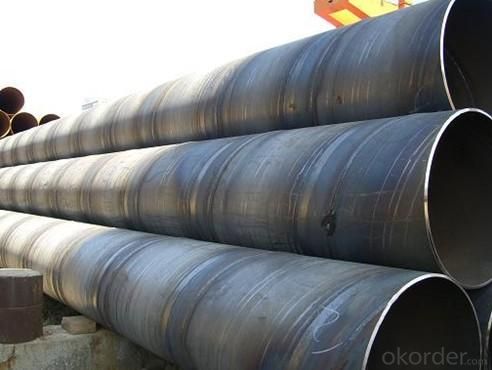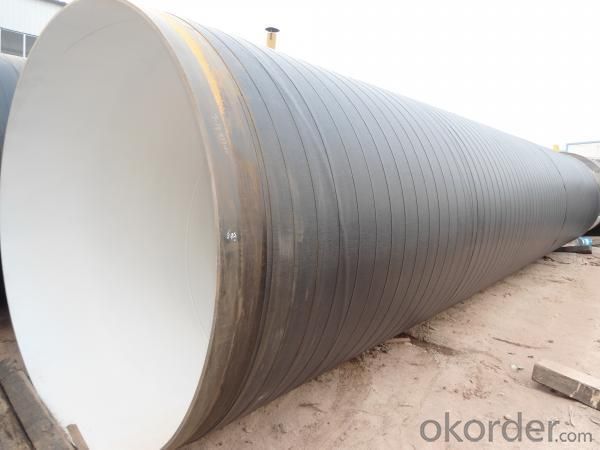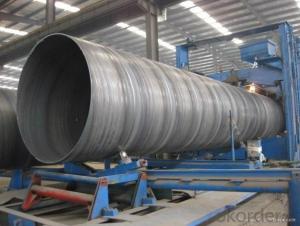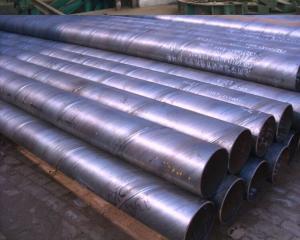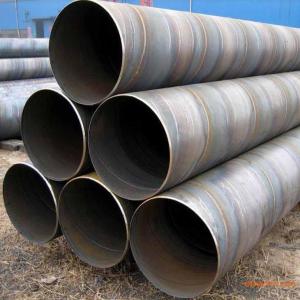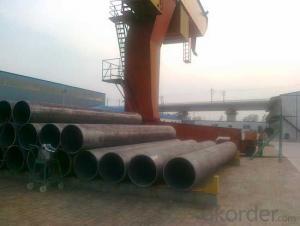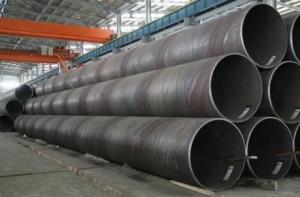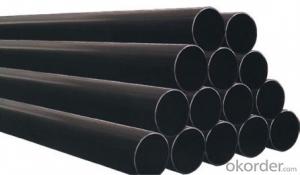API SSAW Welded Steel Pipes
- Loading Port:
- China Main Port
- Payment Terms:
- TT or L/C
- Min Order Qty:
- 50MT m.t.
- Supply Capability:
- based on order m.t./month
OKorder Service Pledge
OKorder Financial Service
You Might Also Like
API SSAW Welded Steel Pipes
Application of API SSAW Welded Steel Pipes
It is widely applied to line pipe in oil and sewage transportation , and it is used in Low pressure liquid and gassy transportation and it is also good Structure pipe in building and bridge field.
Package of API SSAW Welded Steel Pipes
Bundles with anti-rust painting and with plastic caps
Standard of API SSAW Welded Steel Pipes
API SPEC 5L, API SPEC 5CT, ASTM A53, GB/T9700.1
Steel Grade of API SSAW Welded Steel Pipes
API SPEC 5L: B, X42, X46, X52, X56, X60, X65
API SPEC 5CT: J55, K55, N80, L80-1
ASTM A53: A, B, C
GB/T9700.1:L242、L290、L320、L360、L390、L415、L450
Sizes of pipes of API SSAW Welded Steel Pipes
*Remark: Besides below sizes, we also can arrange production based on requirement of customers
OD | WT | ||||||||
NoninalPipe size Inches | OD MM | 10 | 20 | 30 | STD | 40 | 60 | XS | 80 |
12 | 323.90 |
| 6.35 | 8.38 | 9.53 | 10.31 | 14.27 | 12.70 | 17.48 |
14 | 355.60 | 6.35 | 7.92 | 9.53 | 9.53 | 11.13 | 15.09 | 12.70 | 19.05 |
16 | 406.40 | 6.35 | 7.92 | 9.53 | 9.53 | 12.7 | 16.66 | 12.70 | 21.44 |
18 | 457.00 | 6.35 | 7.92 | 11.13 | 9.53 | 14.27 | 19.05 | 12.70 | 23.88 |
20 | 508.00 | 6.35 | 9.53 | 12.7 | 9.53 | 15.09 | 20.62 | 12.70 | 26.19 |
22 | 559.00 | 6.35 | 9.53 | 12.7 | 9.53 |
| 22.23 | 12.70 | 28.58 |
24 | 610.00 | 6.35 | 9.53 | 14.27 | 9.53 | 17.48 | 24.61 | 12.70 | 30.96 |
26 | 660.00 | 7.92 | 12.70 |
| 9.53 |
|
| 12.70 |
|
28 | 711.00 | 7.92 | 12.70 | 15.88 | 9.53 |
|
| 12.70 |
|
30 | 762.00 | 7.92 | 12.70 | 15.88 | 9.53 |
|
| 12.70 |
|
32 | 813.00 | 7.92 | 12.70 | 15.88 | 9.53 | 17.48 |
| 12.70 |
|
34 | 864.00 | 7.92 | 12.70 | 15.88 | 9.53 | 17.48 |
| 12.70 |
|
36 | 914.00 | 7.92 | 12.70 | 15.88 | 9.53 | 19.05 |
| 12.70 |
|
38 | 965.00 |
|
|
| 9.53 |
|
| 12.70 |
|
40 | 1016.00 |
|
|
| 9.53 |
|
| 12.70 |
|
42 | 1067.00 |
|
|
| 9.53 |
|
| 12.70 |
|
44 | 1118.00 |
|
|
| 9.53 |
|
| 12.70 |
|
46 | 1168.00 |
|
|
| 9.53 |
|
| 12.70 |
|
48 | 1219.00 |
|
|
| 9.53 |
|
| 12.70 |
|
Mechanical Properties
Standard | Grade | (MPa) | (MPa) | Min(%) |
Yield strength | Tensile Strength | Elongation | ||
GB/T9711.1 | L245 | ≥245 | ≥415 | 21 |
L290 | ≥290 | ≥415 | 21 | |
L320 | ≥320 | ≥435 | 20 | |
L360 | ≥360 | ≥460 | 19 | |
L390 | ≥390 | ≥490 | 18 | |
L415 | ≥415 | ≥520 | 17 | |
L450 | ≥450 | ≥535 | 17 | |
L485 | ≥485 | ≥570 | 17 |
Chemical Composition(%)
Standard | Grade | C | Mn | P | S |
Max | Max | Max | Max | ||
GB/T9711.1 | L245 | 0.26 | 0.15 | 0.030 | 0.030 |
L290 | 0.28 | 1.25 | 0.030 | 0.030 | |
L320, L360 | 0.30 | 1.25 | 0.030 | 0.030 | |
L390, L415 | 0.26 | 1.35 | 0.030 | 0.030 | |
L450 | 0.26 | 1.40 | 0.030 | 0.030 | |
L485 | 0.23 | 1.60 | 0.025 | 0.030 |
Mechanical Properties
Standard | Grade | (MPa) Yield strength | (MPa) Tensile Strength | Min(%) Elongation | ||
GB/T9711.2 | Rt0.5Min | Rt0.5Max | RmMin | Rt0.5/Rm Max | ||
L245 | 245 | 440 | 0.80 |
22 | ||
L245 | 0.85 | |||||
L290 |
290 | 440 | 0.80 | 21 | ||
L290 | 0.85 | |||||
L360 |
360 | 510 | 0.85 |
20 | ||
L360 | 0.85 | |||||
L415 | 415 | 565 | 0.85 |
18 | ||
L415 | 0.85 | |||||
L450 | 450 | 570 | 535 | 0.87 | 18 | |
L485 | 485 | 605 | 570 | 0.90 | 18 | |
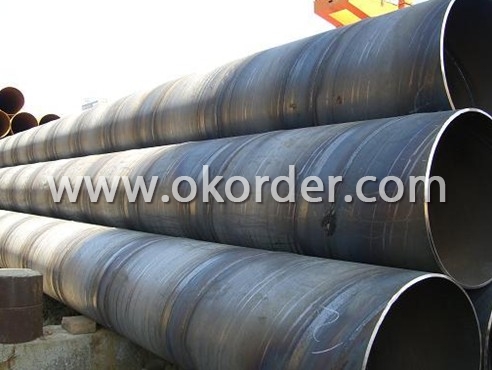
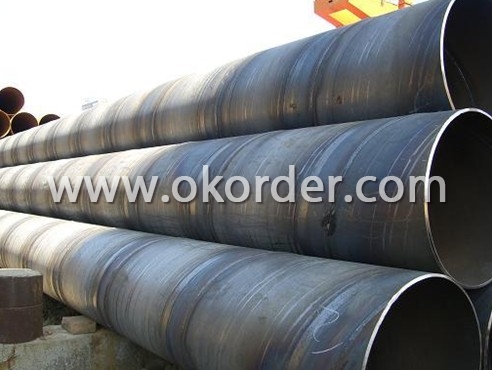
- Q: Can steel pipes be used for oil drilling operations?
- Yes, steel pipes are commonly used for oil drilling operations. They possess the necessary strength and durability to withstand the harsh conditions of drilling and transporting oil. Additionally, steel pipes have excellent corrosion resistance, making them suitable for long-term use in the oil and gas industry.
- Q: Can steel pipes be used for transporting liquids?
- Yes, steel pipes can be used for transporting liquids. Steel pipes have excellent durability, strength, and corrosion resistance, making them a suitable choice for transporting various liquids, including water, oil, gas, and chemicals.
- Q: What is the standard length of steel pipes?
- The standard length of steel pipes varies depending on the industry and application. However, common standard lengths for steel pipes range from 18 to 22 feet, with some variations based on specific requirements or international standards.
- Q: What is the difference between carbon steel and cast iron pipes?
- The main difference between carbon steel and cast iron pipes lies in their composition and manufacturing processes. Carbon steel pipes are made from an alloy of iron and carbon, with additional elements such as manganese and silicon added for specific properties. They are typically stronger and more durable, making them suitable for high-pressure and heavy-duty applications. On the other hand, cast iron pipes are made by melting iron and pouring it into molds, resulting in a more brittle and less flexible material. Cast iron pipes are commonly used for drainage and sewage systems due to their corrosion resistance and sound insulation properties.
- Q: SC15 what does galvanized steel pipe look like?
- Zinc plating: galvanized steel pipe hot galvanized and galvanized two kinds, hot galvanized, zinc coating thickness, with uniform coating, adhesion, long service life and so on. The cost of galvanizing is low, the surface is not very smooth, and the corrosion resistance of itself is much better than that of galvanized pipe. Refer to
- Q: What are the thermal properties of steel pipes?
- Steel pipes have excellent thermal conductivity, meaning they can efficiently transfer heat. They also have a high melting point and can withstand high temperatures without deformation. Additionally, steel pipes have low thermal expansion, allowing them to maintain their shape and structural integrity even when exposed to extreme temperature changes.
- Q: How do steel pipes connect to other components?
- Steel pipes can connect to other components through various methods such as welding, threading, flanges, or mechanical couplings.
- Q: How are steel pipes tested for pressure and leakage?
- Steel pipes are tested for pressure and leakage through various methods including hydrostatic testing, pneumatic testing, and ultrasonic testing. Hydrostatic testing involves filling the pipe with water and applying pressure to check for any leaks or weaknesses. Pneumatic testing involves using compressed air instead of water. Ultrasonic testing uses high-frequency sound waves to detect any flaws or defects in the pipe material. These testing methods ensure that steel pipes meet the required standards for pressure and leakage resistance.
- Q: Can steel pipes be used for underground air supply systems?
- Indeed, underground air supply systems can make use of steel pipes. Due to their robustness, endurance, and ability to withstand external forces like corrosion and impact, steel pipes are frequently employed in underground settings. They possess the capacity to endure the pressure and temperature prerequisites of air supply systems while also being effortlessly installed below ground. Moreover, steel pipes boast an extended lifespan, rendering them a financially prudent option for underground air supply systems. Nonetheless, when selecting the suitable steel pipes for a particular underground air supply system, it is crucial to take into account factors such as soil conditions, potential for corrosion, and local regulations.
- Q: What is the thickness of steel pipes?
- The thickness of steel pipes varies depending on the specific application and type of pipe used. Typically, steel pipes are available in various thicknesses, measured by their schedule or wall thickness. Schedule 40 is the most common schedule for steel pipes, known for its standard wall thickness. However, for applications demanding higher strength or pressure resistance, thicker pipes with higher schedules like Schedule 80 or Schedule 160 are also available. Moreover, the thickness of steel pipes can be tailored to meet specific project requirements.
1. Manufacturer Overview
| Location | Tianjin, China |
| Year Established | 2001 |
| Annual Output Value | 500,000Tons |
| Main Markets | Southeast Asia; Middle East; Oceania; Americas; Europe; Africa;etc. |
| Company Certifications | API 5L;API 5CT;ISO9001:2008 GB/T 19001-2008 |
2. Manufacturer Certificates
| a) Certification Name | |
| Range | |
| Reference | |
| Validity Period |
3. Manufacturer Capability
| a) Trade Capacity | |
| Nearest Port | Tianjin;Qingdao |
| Export Percentage | 50% - 60% |
| No.of Employees in Trade Department | 1000-1100 People |
| Language Spoken: | English; Chinese; Spanish |
| b) Factory Information | |
| Factory Size: | Above 150,000 square meters |
| No. of Production Lines | Above 10 |
| Contract Manufacturing | OEM Service Offered; Design Service Offered |
| Product Price Range | Average |
Send your message to us
API SSAW Welded Steel Pipes
- Loading Port:
- China Main Port
- Payment Terms:
- TT or L/C
- Min Order Qty:
- 50MT m.t.
- Supply Capability:
- based on order m.t./month
OKorder Service Pledge
OKorder Financial Service
Similar products
Hot products
Hot Searches
Related keywords
